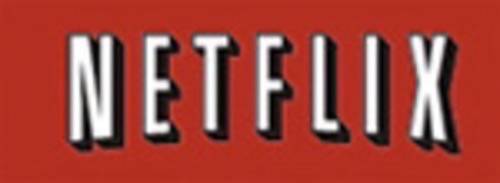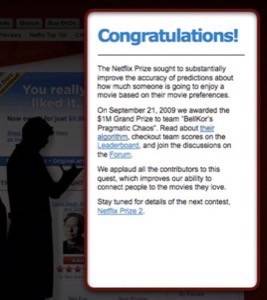After years of struggling to beat Netflix’s Cinematch recommendation algorithm by a baseline of 10%, two groups have emerged. While both teams produced qualifying systems, BellKor’s Pragmatic Chaos submitted their entry 24 minutes earlier than 2nd prize team The Ensemble. Earlier this year ReadWriteWeb covered the Netflix Prize and asked the question, “Will the $1 million dollars be won in 2009?” While the answer is a resounding “yes”, it was not January forerunner BellKor that took the prize, but rather an amalgamation of 4 teams that triumphed.

As reported a month ago, a group made up of researchers from AT&T, Yahoo! Research Israel, Commendo Research and Consulting in Austria, and Montreal’s Pragmatic Theory announced having beaten Cinematch by 10%. As per the Netflix Prize rules, other teams were given 30 days to submit their entries before a winner was declared. With only 24 hours before the contest deadline, two teams jockeyed for position on the Netflix Prize leaderboard. BellKor posted both an additional Netflix submission and a blog post documenting those last excitement-filled hours of the competition.

Of the thousands of entries, Gavin Potter, a retired management consultant with no formal machine-learning training managed to rise to number 17 on the Netflix Prize Leaderboard. Potter writes, “The competition has trained several hundred, if not more, people how to properly implement machine learning algorithms on a real world, large scale dataset…This is, almost undoubtedly, the world’s largest set of data on repeated decision making and it’s ripe for analysis. The analysis may not win the competition, but it sure should provide some insights into the way that humans make decisions.”
The public knowledge acquired from the process of producing these algorithms will not only affect Netflix’s ability to suggest customer desires across its movie titles, but it will also form a baseline for other business systems. In addition to streaming entertainment providers, companies like Amazon and Pandora have worked hard to produce the best possible predictive technologies. If these company can tap into our unique tastes, they can suggest products and services we didn’t even know we wanted. So a 10% improvement on recommendations can equate to a lucrative sales increase.
A second shorter term Netflix prize is expected in the near future. According to the New York Times’ Steve Lohr, the Netflix Prize 2 will be concerned with “taste profiles” based on demographic and behavioral data.

















